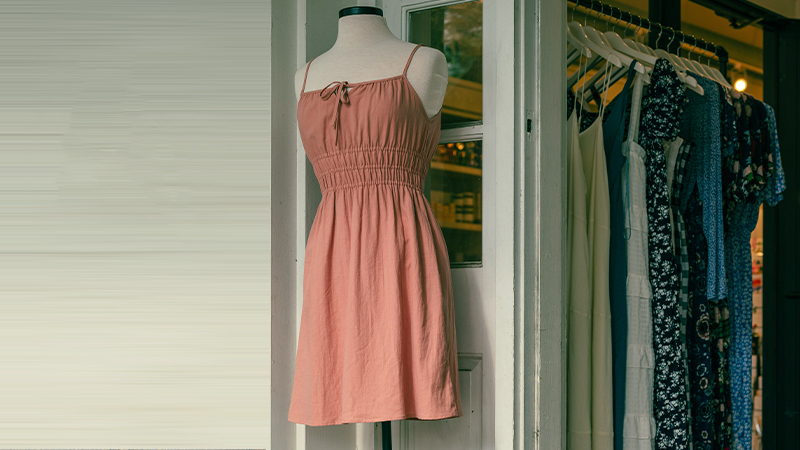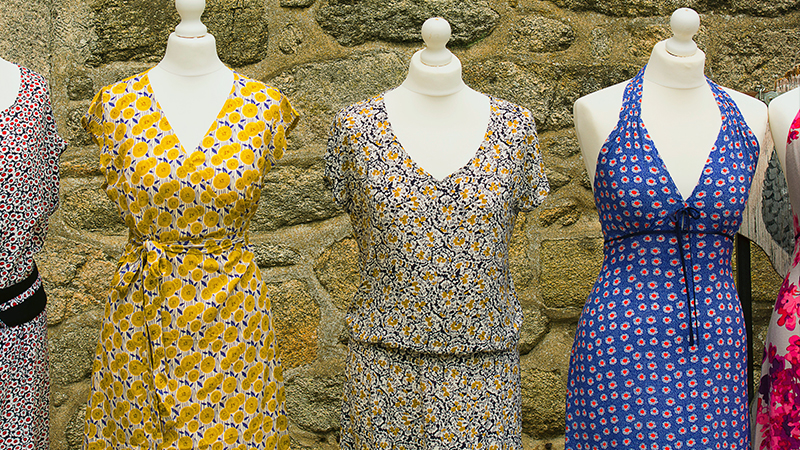The choice of clothing is a powerful form of self-expression, reflecting individual style, confidence, and cultural influences.
Among the myriad of options, some women opt for revealing attire, sparking discussions about the motivations behind this choice. It’s essential to understand that this decision is deeply personal, encompassing a range of reasons.
From celebrating body positivity to embracing one’s sensuality, revealing clothing can be a declaration of agency over one’s own body. Fashion trends, peer influences, and career requirements also play a role.
This exploration aims to shed light on the diverse motivations, dispelling stereotypes, and encouraging a more inclusive understanding of women’s fashion choices.

What Do You Mean by Revealing Cloth?
“Revealing clothing” refers to garments that show a significant amount of skin or emphasize certain parts of the body, often in a manner that is considered provocative or sexually suggestive.
These garments typically leave little to the imagination and can include clothing items such as low-cut tops, short skirts, shorts, swimsuits, lingerie, or any attire that exposes a substantial portion of the body.
The level of exposure can vary from person to person and can depend on cultural, personal, or situational factors.
The term “revealing clothing” is subjective and can encompass a wide range of styles and items of clothing that draw attention to the body, its shape, or its features.
Why Do Women Wear Revealing Clothing?
Women may choose to wear revealing clothing for various reasons, and it’s important to remember that individual motivations can vary greatly. Clothing choices are highly personal and can be influenced by cultural, social, and personal factors.
Here are some potential reasons why some women may choose to wear revealing clothing:
Self-Expression
Revealing clothing is a medium for women to articulate their individuality and style.
Just as an artist paints on a canvas or a musician composes a song, fashion allows individuals to express their personalities and convey messages about themselves without words.
It’s a way to say, “This is who I am, and this is how I choose to present myself to the world.”
Fashion Trends
The world of fashion is an ever-evolving tapestry of creativity, innovation, and cultural influence. Keeping up with these trends allows individuals to participate in this dynamic conversation.
For some women, this means embracing revealing clothing as a way to stay connected to the zeitgeist of contemporary culture.
Confidence Boost
Wearing revealing clothing can be a powerful confidence booster. It’s akin to wearing a suit of armor, providing a sense of inner strength and self-assuredness.
By accentuating certain features or wearing clothing that makes them feel attractive, women may exude a palpable confidence that positively impacts their interactions and overall sense of well-being.
Body Positivity
The choice to wear revealing clothing can be an act of reclaiming one’s body from societal standards of beauty.
It’s a declaration of self-acceptance, stating that one is content and proud of their body, irrespective of conventional ideals. It’s a beacon for others to embrace their bodies with love and acceptance.
Comfort
Contrary to popular belief, revealing clothing can often be remarkably comfortable. Light, airy fabrics and fewer layers can provide freedom of movement and ventilation, especially in warmer climates.
This comfort factor can be a significant motivator for women who choose these styles.
Attention
Seeking attention through revealing clothing can be an empowering choice.
It’s a way for women to exercise their agency, to be seen and appreciated for their individual beauty and allure. This can lead to a heightened sense of empowerment and self-assuredness in social settings.
Celebrating Sexuality
Sexuality is a fundamental aspect of human nature, and wearing revealing clothing can be a way of celebrating this facet of identity.
It allows women to express their sensuality openly and confidently, without shame or judgment. It’s an affirmation of their right to embrace and express their desires.
Special Occasions
Just as one might wear formal attire to a wedding or a suit to a job interview, wearing revealing clothing can be fitting for certain events.
It’s a way to acknowledge the significance of the occasion and to feel appropriately attired for the atmosphere and purpose of the gathering.
Personal Preference
Ultimately, fashion is a subjective realm, and personal preferences play a central role in one’s clothing choices.
Just as someone may gravitate towards a particular color or cut, some individuals are naturally drawn to revealing styles because they find them aesthetically appealing. It’s a matter of what resonates with their own unique tastes and sensibilities.
Cultural Norms
Fashion is deeply entwined with cultural norms and practices. In some societies, revealing clothing is more accepted and integrated into everyday fashion.
For women in these contexts, wearing such attire might be a customary choice, aligned with the prevailing standards of modesty and style.
Peer Influence
Social circles and peer groups can have a significant impact on clothing choices.
Women might choose revealing clothing to align with the preferences and styles of their friends or to feel a sense of belonging within a particular social group. It’s a way of sharing a common identity and forming connections.
Career Choices
Certain professions require individuals to wear revealing clothing as part of their job description. This can include careers in modeling, entertainment, fitness, or other performance-based fields.
In these cases, wearing revealing attire is a professional necessity rather than a purely personal choice.
Cooling Off
Revealing clothing can be a practical choice, especially in warmer climates. Lighter fabrics and fewer layers allow for better airflow, aiding in temperature regulation and overall comfort.
It’s a functional decision that prioritizes physical well-being in hot weather.
Artistic expression
The human body is often regarded as a form of art, and for some, wearing revealing clothing is a means of expressing themselves artistically.
By adorning their bodies in this way, they create a visual statement that challenges conventions, conveys a message, or simply celebrates the beauty of the human form.
Challenging Stereotypes
Wearing revealing clothing can be a potent statement against traditional societal norms and stereotypes about female modesty and sexuality.
It’s a declaration that a woman’s worth and identity are not solely defined by her clothing choices, and that she possesses agency over her own body and how it is presented to the world.
Impact of Revealing Clothing on Social Perceptions and Stereotypes

The impact of revealing clothing on social perceptions and stereotypes is a complex and multifaceted topic. It’s important to note that individual perspectives can vary widely, and not all individuals will respond in the same way.
Here are some of the potential effects revealing clothing can have on social perceptions and stereotypes:
Positive Body Image and Empowerment
- Empowerment: Some individuals view wearing revealing clothing as a form of empowerment, where women exercise agency over their bodies and challenge traditional norms.
- Body Positivity: It can promote a positive body image by celebrating diverse body types and demonstrating that beauty and confidence are not limited to specific standards.
Challenging Gender Norms
- Rejection of Double Standards: Revealing clothing can challenge the double standards that exist around men’s and women’s attire, highlighting the need for equal treatment and opportunities regardless of clothing choices.
Perception of Confidence and Self-Assuredness
Women who wear revealing clothing may be perceived as confident and comfortable with their bodies, which can positively influence how they are perceived in social interactions.
Attention and Objectification
- Attention Seeking: Some may perceive women in revealing clothing as seeking attention, which can sometimes lead to objectification or shallow judgments about their character.
- Stereotyping as “Provocative”: There might be a tendency to label women in revealing clothing as provocative, which can carry negative connotations.
Sexualization and Stereotypes
- Sexualization: There is a risk of being overly sexualized, where one’s worth is reduced to their physical appearance rather than their intellect, skills, or character.
- Presumption of Intent: Assuming that a woman in revealing clothing is solely seeking sexual attention or is promiscuous, which can perpetuate harmful stereotypes.
Impact on Professional Settings
In some professional settings, wearing revealing clothing may lead to judgment or questions about one’s professionalism, potentially impacting career advancement.
Cultural and Regional Variances
The impact of revealing clothing varies across cultures, with some societies being more accepting while others may view it as inappropriate or offensive.
Perceptions of Confidence vs. Insecurity
Paradoxically, some may assume that women who wear revealing clothing are insecure about their bodies, seeking validation or approval from others.
Peer Influence and Social Acceptance
Women may feel compelled to conform to peer group preferences, leading to choices in clothing that may not align with their personal comfort or values.
Parental and Family Influences
Older generations may have different views on revealing clothing, and this can lead to generational gaps in understanding and acceptance.
Media Influence and Representation
The portrayal of women in revealing clothing in the media can shape societal perceptions and influence how people view such attire.
Intersectionality and Marginalized Groups
The impact of revealing clothing may vary based on factors such as race, ethnicity, sexuality, and socioeconomic status, leading to differing experiences and perceptions.
FAQs
Is wearing revealing clothing solely about seeking attention?
Not necessarily. While some women may appreciate the attention, others wear revealing clothing for reasons like self-expression, comfort, or personal preference.
Does wearing revealing clothing always signify a lack of confidence?
No. For many, wearing revealing clothing can be an empowering choice that helps boost confidence and body positivity.
Is wearing revealing clothing influenced by cultural norms?
Yes, cultural norms can play a significant role. In some cultures, revealing clothing is accepted, while in others, it may be considered inappropriate or offensive.
Can revealing clothing be a form of artistic expression?
Absolutely. Some women view their bodies as a canvas for artistic self-expression and may choose revealing clothing to convey a particular message or challenge conventions.
Does wearing revealing clothing in professional settings impact perceptions of competence?
It can, as perceptions of professionalism vary across different workplaces. In some environments, revealing clothing may be viewed as less appropriate, potentially influencing how one is perceived in a professional context.
To Recap
The choice to wear revealing clothing is a deeply personal and multifaceted decision, shaped by diverse motivations.
For many women, it represents a form of self-expression, confidence, and body positivity. It challenges societal norms, advocating for agency over one’s body and attire.
Cultural influences, fashion trends, and individual preferences further contribute to this choice.
It’s important to recognize that wearing revealing clothing doesn’t define a woman’s character or intentions. Instead, it reflects her autonomy and right to present herself as she sees fit.
Understanding and respecting this choice fosters a more inclusive and empathetic society, where diverse expressions of identity are celebrated and valued.
Leave a Reply